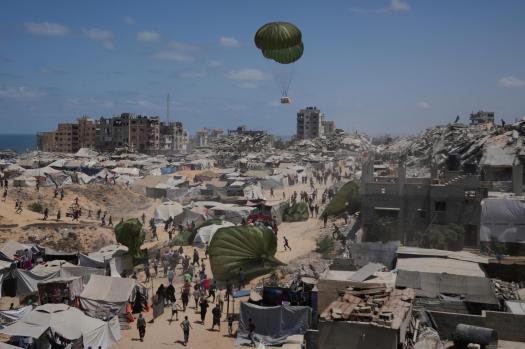By Associated Press’s Joseph Krauss
Early on Friday, Israel declared its intention to occupy Gaza City, the territory’s largest city and one that has already been severely damaged by numerous Israeli raids.
Experts have warned that starvation is imminent in Gaza, and another significant ground operation in one of the few regions not currently under evacuation orders will probably lead to even more widespread displacement and severely impede efforts to transport much-needed food to the region.
Many of Israel’s closest allies have been calling for the conflict to end, and the idea is being opposed within Israel by security establishment officials who believe there is currently little to gain militarily and by the relatives of the roughly 20 surviving hostages held by Hamas. The European Union, Canada, and the United States have all classified Hamas as a terrorist group.
According to Prime Minister Benjamin Netanyahu, Israel needs to apply more military pressure in order to fulfill its objectives of eliminating Hamas and bringing the captives back.
In the weeks following the Hamas strike that started the war on October 7, 2023, Israel often shelled Gaza City and conducted significant ground operations there. Important infrastructure and a number of neighborhoods have been nearly totally devastated.
With 700,000 residents—roughly the same as Washington, D.C.—it was the most populated city in Gaza on the eve of the conflict. During a ceasefire earlier this year, many of the hundreds of thousands who had evacuated under Israeli evacuation orders at the beginning of the war returned.
About 75% of Gaza is already under Israeli control and has been largely destroyed; the majority of the 2 million Palestinians living there are currently taking refuge in Gaza City, the central city of Deir al-Balah, and the massive displacement camps in the coastal Muwasi area.
Israel will need to deploy its forces and is anticipated to order another mass evacuation, thus the date of the operation is still uncertain.
Over 61,000 Palestinians have now been murdered by Israel’s offensive, according to Gaza’s Health Ministry, which does not specify the number of fighters or civilians slain. The ministry employs medical experts and is a part of the Hamas-run government. Its estimates are considered the most accurate estimate of war losses by the United Nations and independent analysts. Israel has not offered its own, but it contests them.
More Israeli soldiers will most likely be killed in hit-and-run attacks as a result of another significant ground operation, which might jeopardize the remaining hostages and reduce support for the conflict at home.
In the Oct. 7 massacre, terrorists led by Hamas killed almost 1,200 people, primarily civilians, and took 251 hostages. Since then, the majority have been freed through ceasefires or other agreements. About 20 of the 50 people who are still inside the zone are thought to be alive by Israel.
Videos of malnourished prisoners have been made public by Palestinian rebels in recent days, claiming that the hostages are going through the same famine as the Palestinian people. The hostages are reportedly being held by Hamas in tunnels and other covert locations, and the group has threatened to kill them if Israeli soldiers approach.
After Hamas has been completely destroyed, former security officials have also opposed additional military operations, arguing that there is no benefit. According to reports, Lt. Gen. Eyal Zamir, Israel’s military chief of staff, contended at a Security Cabinet meeting that a more comprehensive plan to recover all of Gaza would put the hostages in danger and further tax the army following two years of regional conflicts.
Germany, one of the proposal’s greatest supporters, made the startlingly swift decision to stop exporting weapons that could be used in the ongoing fight, and other European nations, including Israel’s close friends, have already voiced opposition to the plan. Saudi Arabia and Turkey, two powerful regional nations, denounced the initiative as well.
In recent weeks, Israel has faced increasing international pressure as the growing food crisis has been brought to light by pictures of malnourished children.Last month, it was urged to cease the war by 28 Western-aligned countries, including some of its closest friends.
The hunger issue has even drawn the attention of U.S. President Donald Trump, who has been its staunchest ally in the White House. Although he has stated that he wants the war to end and all the hostages returned, he has also stated that Israel must determine its next course of action.
Israel has rejected the criticism, claiming that it has taken all reasonable precautions to prevent civilian casualties and that Hamas is to blame for the deaths. Despite eyewitness accounts, expert-compiled data, and dire warnings from prominent international humanitarian organizations and the United Nations, Netanyahu has denied that there is famine in Gaza.
According to Netanyahu, additional military pressure is required to persuade Hamas to agree to the hostages’ release and surrender.
However, one of the bloodiest and most damaging military operations since World War II has already been escaped by Hamas. According to the group, it will only free the other hostages in exchange for an Israeli pullout and a permanent truce.
In a statement, Hamas dismissed the news about Gaza City, claiming that increasing its aggression against the Palestinian people would not be easy.
Visit https://apnews.com/hub/israel-hamas-war to follow AP’s coverage of the conflict.








